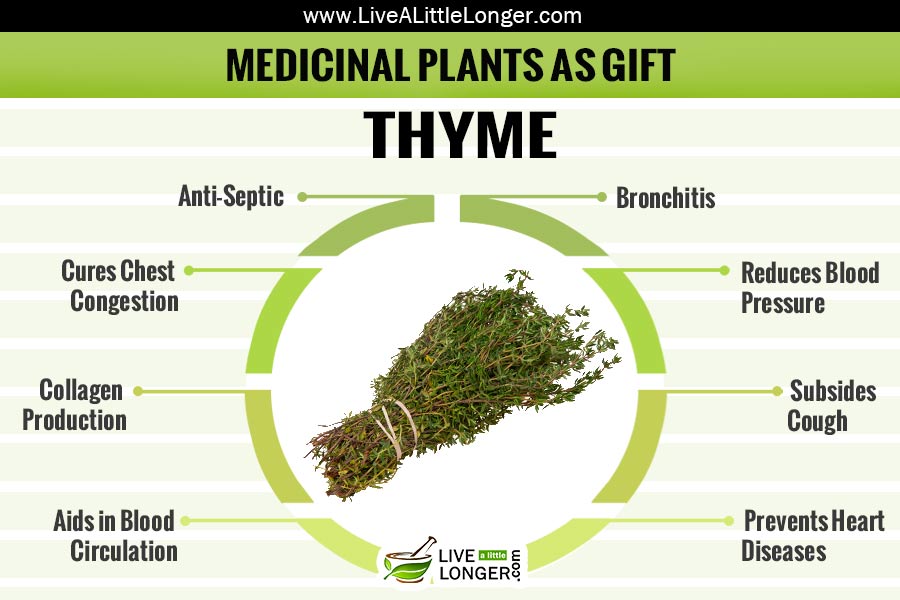The herb, thyme has medicinal, ornamental and culinary uses. You can get thyme both in dried as well as fresh form. For culinary and medicinal use, the herb can be found as sprig bundles (sprig – single stem taken from the plant). The height of this plant varies from six to twelve inches. In this article on medicinal herbal plant that can be given as gift you will be given information as to how to grow thyme indoors, its culinary uses as well as its medicinal uses. The herbal tea prepared out of thyme is used for coughs as well as bronchitis.

Thyme Can Be Grown Indoors
The seeds of this herbal plant are so small; you can sow many. It is important to sow only a few seeds in a pot. However, ensure that disease does not affect the plant.
A gift to a loved one should be cherished and it will be better if the ‘present’ is a herb that can be used for culinary, medicinal and aromatic purposes. Some people have the notion that herbs are found only in the dense forest, which is far from true. You can grow them in the tight vicinity of your home provided you give the proper environmental conditions. Thyme can be regarded as one of the easiest herbs to grow indoors.
The best way to give thyme as a gift will be in a clay pot. This herb does not grow under soggy root conditions. A large drainage hole is needed for leaching extra water. The right type of growth would be a clay pot with sand, peat moss, perlite, potting soil and six hours of sunlight. It can be grown as one of the plants in the kitchen herb garden. The temperature should be around sixty degrees in the day time.
After you water any thyme pot, let it dry before giving water to the plant. The mentioned items in the previous paragraph will give the necessary nutrients but you can also pack off liquid seaweed or fish emulsion as per the requirement for thyme. Use the leaves or flowers in tea. Follow the instructions of an expert gardener if you have to include herb thyme in your kitchen garden.
Medicinal Properties of Thyme
Because of its anti-septic properties, you can find thymol in Listerine. In alternative medicine, thyme has always retained its place for respiratory as well as chest problems which includes chest congestion, bronchitis and coughs.
The volatile oil containing components are borneol, geraniol and thymol. Thymol promotes the percentage of fats (healthy) in cell structures and cell membranes.
The other flavonoids found are luteolin, apigenin and naringenin. These components are known for enhancing the antioxidant capacity of the body. The other components found are Vitamin C, Vitamin A and minerals such as dietary fiber, copper, manganese, potassium and iron found in leaves.
Vitamin C is known for enhancing the immunity of the body while as Vitamin A is necessary for vision. The beta-carotene present in thyme can reduce cataracts and the formation of macular degeneration.
Along with vitamin C, it also has zeaxanthin and lutein that can neutralize/eliminate free radicals in the entire body. Vitamin C can increase the number of white blood cells, the first form of defense in the immune system of the body. It also plays a vital part in collagen production (needed for repair and creation of tissues, muscles, blood vessels and repair of cells).
Vitamin B6 present in thyme can act as a powerful stimulator of positive hormones in the brain and assist in neutralizing thoughts of stress.
Iron is needed by hemoglobin to carry oxygen in the blood to cells. The other benefits of high quantity of iron are that it enhances the number of red blood cells in the body. In other words, the circulation of blood in the entire body is promoted and you maintain good health.
Potassium is vital for regulation of heart rate as well as blood pressure. Potassium, also known as a vasodilator, can relax blood vessels and maintain the low blood pressure. You are saved from strokes, heart attacks and coronary heart disease.
So we hope that the next time you want to present a gift to a loved one, you would surely select one of the herbal plants given in our website. Help us make the world know about the medicinal uses of herbs and rare plants by sharing our articles.
For herbal plants, which can be grown indoors, click here.
To know about growing aloe vera in home and its medicinal properties, check the link.
To know about parsley as a kitchen cabinet herb as well as its therapeutic properties, click this link.
Do you know that the popular flower rose also has medicinal properties? To know more, you can go through this link.


